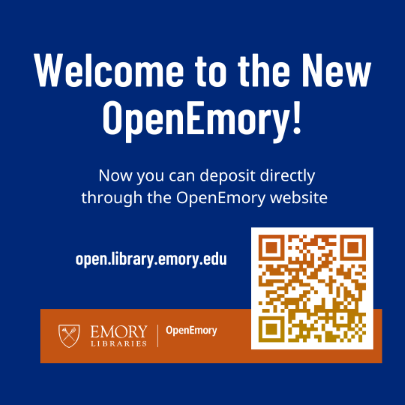 Welcome to the new OpenEmory! OpenEmory is an open access repository of Emory faculty scholarly works and a service of Emory Libraries. It was created in response to the Emory Open Access Policy passed by Faculty Council in March 2011. The scope of OpenEmory at its 2012 launch was Emory faculty-authored articles. In 2016, it expanded to reflect the variety of formats in which faculty share the results of their research and scholarship. In its third iteration, OpenEmory is expanding and simplifying its options for depositing scholarly works.
Welcome to the new OpenEmory! OpenEmory is an open access repository of Emory faculty scholarly works and a service of Emory Libraries. It was created in response to the Emory Open Access Policy passed by Faculty Council in March 2011. The scope of OpenEmory at its 2012 launch was Emory faculty-authored articles. In 2016, it expanded to reflect the variety of formats in which faculty share the results of their research and scholarship. In its third iteration, OpenEmory is expanding and simplifying its options for depositing scholarly works.
Content can now be deposited directly into OpenEmory via the website. Our manual entry form now allows for a wide variety of scholarly works to be submitted by the content creators themselves. The Scholarly Communications Office is still available to assist with uploading materials, but content creators can now deposit their works in the repository without mediation. All you need is an Emory login to create records of your scholarly works in the repository.
Previously, all submissions had to be PDFs, but that is no longer the case. Our expanded depositing options provide the opportunity to share even more kinds of scholarly content than before. The repository now accepts Word documents, Excel spreadsheets, PowerPoint presentations, and image files, allowing for a wide range of scholarly materials to be shared with the general public.
For information on how to deposit your scholarly works, please review our instructions and depositing advice.
The majority of the works currently in OpenEmory are open access journal articles and books, but all scholarly works by Emory faculty, staff, and graduate students are now accepted. The repository is a platform to post works that are not otherwise published and therefore inaccessible to researchers. For more information on what counts as scholarly work accepted into the repository, you can review our previous post on the subject.
When depositing scholarly works that have not been previously published, authors are granting Emory a non-exclusive license (i.e., permission) to archive and share the work with the public; copyright remains with the author(s). Authors can choose to add a Creative Commons (CC) license to their work to specify how it can be reused by researchers. For information on what kinds of CC licenses are available and their benefits, please review the Creative Commons website, or contact our office for assistance.
Any questions regarding the updates to OpenEmory can be directed to the Scholarly Communications Office.
— Kylie Shannon, scholarly repository coordinator; Jennifer Townes, open access librarian
